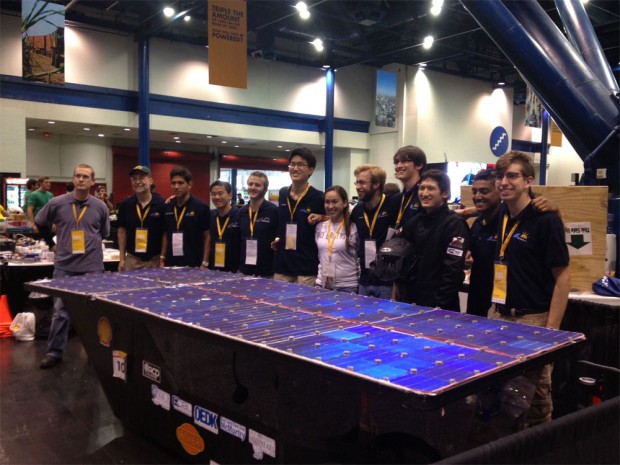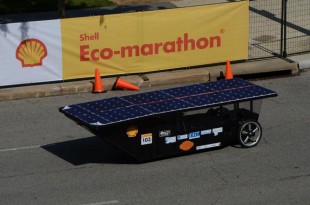The Rice University Solar Car club charged out of the blocks and won second place in its first Shell Eco-marathon Americas over the weekend. Rice finished behind a team from Newburgh (N.Y.) Free Academy in the prototype solar category.
The team overcame a series of obstacles that dogged it right up until the start of the downtown Houston event, in which they made multiple attempts to drive 6 miles — 10 laps around the Discovery Green track — within 24 minutes and 15 seconds. Cars were judged not so much for speed as for efficiency in each of the categories, which also included gas, diesel, electric and alternative fuels. Even before reaching the track on Thursday, club members pulled a series of all-nighters at the Oshman Engineering Design Kitchen to configure solar panels that arrived days before the event and had to be painstakingly pieced together. The team was successful in its first trial on Saturday; it finished the course in the allotted time, but Shell’s joulemeters refused to display the amount of energy gathered by the solar panels, the main criteria for judging. On the second run, the car driven by Duncan College senior Kerry Wang broke an axle on the third lap. With fixes in place, the team completed a series of runs on Sunday. “We’re very excited to have been able to accomplish this in our first ever solar car race, and we’ve learned a lot in the process,” said club co-president and Duncan College sophomore Allison Garza. “We’re looking forward to designing and building more cars in the future and representing Rice in competitions around the country and, eventually, around the world.” 
- The Rice Solar Car team brought its vehicle, RSC Enterprise, to the Shell Eco-marathon Americas for the first time this year. The team finished second in the prototype solar class.



CONGRATULATiONS – Rice’s unconventional wisdom always wins!
congratulations to the Rice Solar Car team. hopefully it’ll be a better future
Wow! this is something of a shocker but then again people should just remember the amount of r&d being put in to this kind of thing right now.
From the Laval University’s supermileage car website (http://alerionsupermileage.ca/), their car looks like a bullet and weighs 94 lbs. The Enterprise weighs 209 lb and is built like a tank. With it’s new steering system, I’d say Enterprise is probably one of the most mechanically robust cars at the competition (volumetrically, it’s definitely the biggest). Man I love our car!
After the competition this weekend, I am very much convinced that the future of personal transportation is with electric vehicles. ICEs are LOUD, directly produce air pollution (those at the race will recall how loud and smelly some cars were!), have many moving parts, require a ton of mechanical maintenance, and are less efficient. Good to know Rice scientists and engineers are leading the way towards the future!
Congratulations to the Rice Solar Car team. What a great effort . Keep up the good work
In the RSC Enterprise’s last run, we had a net energy usage of ~200 kJ to drive the 6.0 mile track. Assuming 128704 kJ/gallon of gasoline (see “Energy Density” on Wikipedia), that’s about 3861 mpg. The internal combustion engine (ICE) efficiency record holder for Shell Eco-Marathon is 2487.5 mpg, from Laval University.
In order to get that kind of efficiency, ICE vehicles often use the “pulse and glide” technique, which basically involves accelerating to a high speed, turning off the engine, coasting, and repeating. On the other hand, RSC Enterprise can achieve our efficiency while driving at constant speeds (much more practical for actual driving, I’d say). And if the sun is strong, we can operate the motor completely off of solar power, with zero input from the battery! Solar electric power FTW!